Tauranga's Claire Dale says she had goosebumps when she heard the news that the Government announced a dramatic increase in the fines for abusing mobility parking spaces.
Starting from October 1, 2024, the penalty for illegally occupying a mobility parking spot will rise from $150 to $750.
This significant change follows Claire's determined grassroots campaign to bring national attention to the issue.
“Oh, my goodness,” says Claire on hearing about the Government announcement. “I had goosebumps.
“I got a call to say it was being announced, about half an hour before it hit mainstream media.”
Claire’s journey began in August 2021 when she called on the community to help support her petition calling for stricter enforcement of mobility parking regulations.
Her timing was unfortunate, as the petition went live just hours before New Zealand entered its second Covid-19 lockdown. Despite these challenging circumstances, Claire remained resolute in her mission.
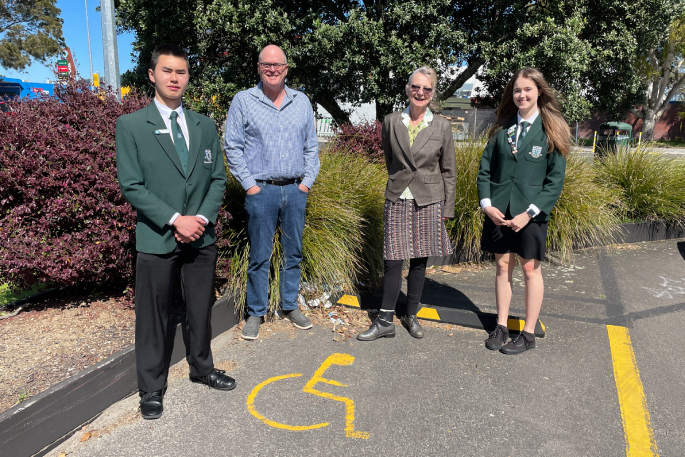 Otūmoetai College student Josia Vickers, former Bay of Plenty MP Todd Muller, Claire Dale and Otūmoetai College student Rachel Dunn. Photo: SunLive.
Otūmoetai College student Josia Vickers, former Bay of Plenty MP Todd Muller, Claire Dale and Otūmoetai College student Rachel Dunn. Photo: SunLive.
She reached out to media outlets, CCS Disability Action, Grey Power and even enlisted the help of Otūmoetai College students Josia Vickers and Rachel Dunn to assist with the technical aspects of her campaign.
Claire’s petition, which sought to increase fines for misuse of mobility parking spaces and to push for a public education campaign, faced numerous hurdles.
“Running the petition and getting signatures was an uphill battle as Auckland was in lockdown, and then when it was presented at Parliament, that was during the mandate protest,” says Claire.
The petition closed on February 14, 2022, with a commendable 2739 signatures.
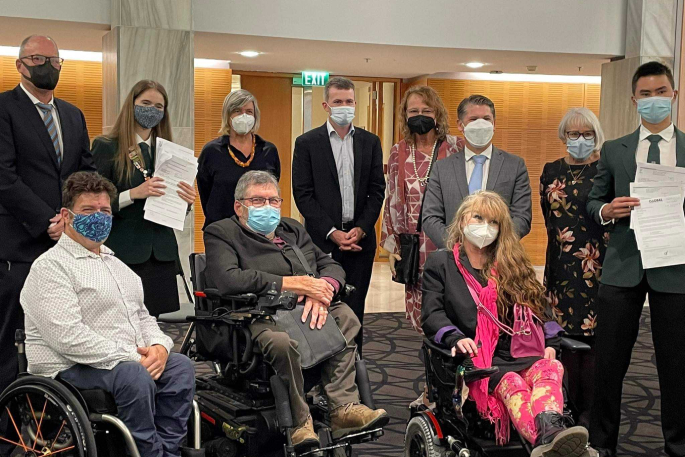 Claire Dale presenting the petition to Parliament, accompanied by Otūmoetai College students Rachel Dunn and Josia Vickers and former Bay of Plenty MP Todd Muller. Photo: Supplied.
Claire Dale presenting the petition to Parliament, accompanied by Otūmoetai College students Rachel Dunn and Josia Vickers and former Bay of Plenty MP Todd Muller. Photo: Supplied.
On February 28, 2022, Claire, accompanied by Josia and Rachel, presented her petition to Parliament, emphasising the need for higher fines and a more robust enforcement strategy.
Claire’s petition states: ‘That the House of Representatives change the law to substantially increase fines nationally for misusing any mobility parking spaces, including on privately owned land that is used publicly; and urge the government to run an education campaign to desist able-bodied people from misusing mobility parking spaces for public use’.
The legislative journey was arduous, with the petition being reviewed by a select committee.
“At select committee I was asked to work with CCS Disability Action, NZTA Waka Kotahi, and Police, and a couple of other people who had knowledge of the issues and of what we could possibly do.”
 Claire Dale presented the petition to Parliament, accompanied by Otūmoetai College students Rachel Dunn and Josia Vickers, and former Bay of Plenty MP Todd Muller. Photo: Supplied.
Claire Dale presented the petition to Parliament, accompanied by Otūmoetai College students Rachel Dunn and Josia Vickers, and former Bay of Plenty MP Todd Muller. Photo: Supplied.
The Select Committee’s interim report was released on November 28, 2022, and the final report on August 29, 2023.
Claire, who initially proposed a fine increase to $550, also advocated for indexing the fine to inflation to avoid future delays in adjustments.
“The last time they raised the fine was 20 years ago and it shouldn’t take another Government involvement to increase it.”
The Government’s recent announcement marks a decisive victory for Claire and the wider disability community.
Disability Issues Minister Louise Upston hails the increase as a crucial step in addressing mobility parking abuse, which she described as “the epitome of arrogance”.
“Increasing penalties for people who misuse mobility parking will level the playing field for disabled people by helping prevent unnecessary disruptions in their day-to-day lives,” says Upston.
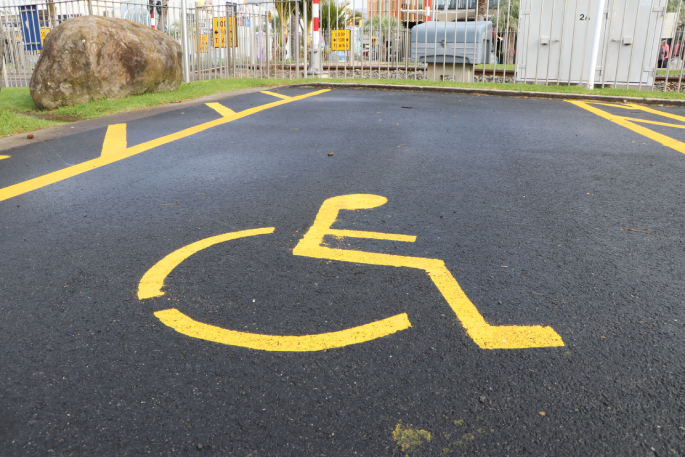 Starting from October 1, 2024, the penalty for illegally occupying a mobility parking spot will rise from $150 to $750. Photo: SunLive.
Starting from October 1, 2024, the penalty for illegally occupying a mobility parking spot will rise from $150 to $750. Photo: SunLive.
Upston emphasises that the new penalty reflects the seriousness of the offence and aligns New Zealand’s approach with that of countries like Australia, where on-the-spot fines for similar infractions can be around $500.
Transport Minister Simeon Brown echoes these sentiments, noting that the adjustment in penalties also includes significant changes to towage and impoundment fees.
“Towage fees have been too low for too long. This has meant that tow-truck operators are often left out of pocket for the service they provide. That’s not acceptable and is why we’re updating fees,” says Brown.
“Parking infringement fees have not been updated in two decades, making councils’ role in managing public parking increasingly difficult. For example, in Auckland, this has meant that paying a parking ticket is sometimes cheaper than paying for parking.
These fees have not been updated since 2004 and will now see a 68 per cent increase for towage and a 98 per cent increase for storage and mileage fees.
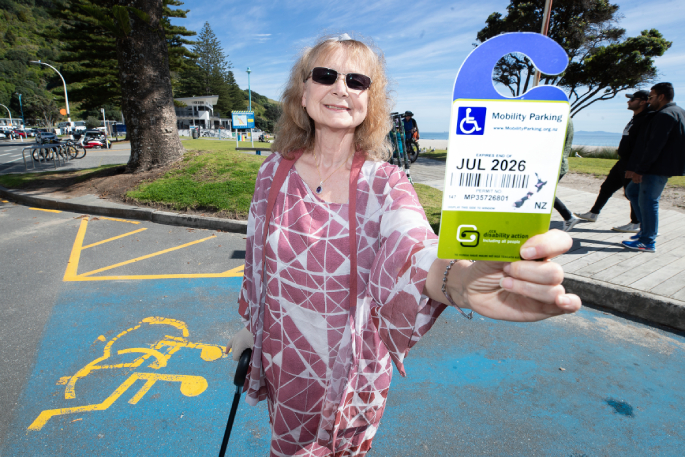 Claire Dale, with a mobility parking pass. Photo: John Borren.
Claire Dale, with a mobility parking pass. Photo: John Borren.
Brown explains that these changes are designed to ensure that towing operators are adequately compensated for their services and to support local councils in managing public parking more effectively.
CCS Disability Action, which manages the Mobility Parking scheme for approximately 170,000 users across New Zealand, is welcoming the Government’s decision.
BJ Clark, the National Manager of Access and Infrastructure at CCS Disability Action, emphasises that the increase in fines will serve as a deterrent against the widespread abuse of mobility parking spaces.
The organisation has been lobbying for stricter penalties and cohesive enforcement across public and private spaces for many years.
“Mobility parking abuse is rife in New Zealand. Research we commissioned showed that nearly one-third of users of mobility parking spaces do not have a permit to do so legally,” says BJ.
“This widespread abuse highlights a severe lack of understanding and respect for the importance of mobility parking. Today’s announcement changes that – hopefully people will think twice before taking a park they have no right to use.”
BJ also highlights the positive impact that accessible parking can have on individuals’ daily lives, noting that it can be crucial for accessing essential services and maintaining social connections.
“It can be the difference between a person being able to go to the supermarket, get to a medical appointment or meet a family member – or missing out completely.”
The organisation hopes that the revenue generated from fines will be reinvested into initiatives that enhance local accessibility.
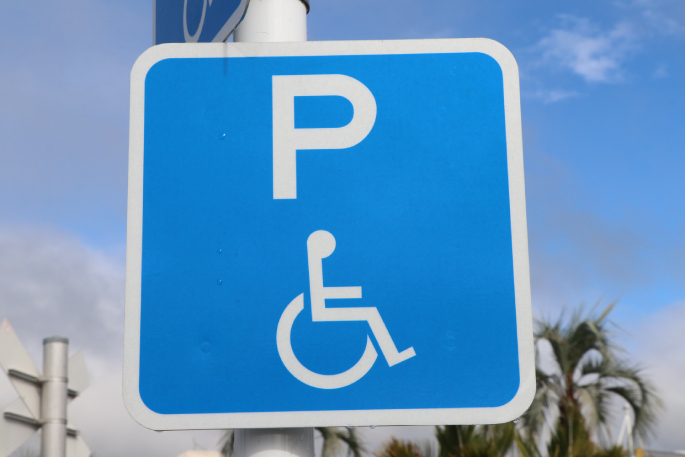 A mobility parking sign in Tauranga. Photo: SunLive.
A mobility parking sign in Tauranga. Photo: SunLive.
Reflecting on her campaign, Claire expresses her astonishment and satisfaction with the outcome.
“When the proposal went to parliamentary debate in March and passed unanimously, I thought it would be a long wait. It’s incredibly gratifying to see this issue finally addressed.”
Her knowledge of what was required to see the petition through effectively came after researching other countries’ laws – Australia, USA, Canada, UK and Europe.
“It was a big learning curve. I know far too much now about mobility parking in too many countries.”
She says the NZ Government decide to call it a human rights issue, which she found gave her some more leverage.
“At the last Select Committee meeting I’m afraid I told the politicians that as they had declared it a human rights issue, I would take it to the Human Rights Commission if they didn’t legislate.
“Things moved rapidly after that.”
BJ says this move brings New Zealand more in line with comparable countries like Australia, where on-the-spot fines can sit around $500 depending on the state.
“People who use the Mobility Parking scheme deserve to be able to be part of our communities,” says BJ.

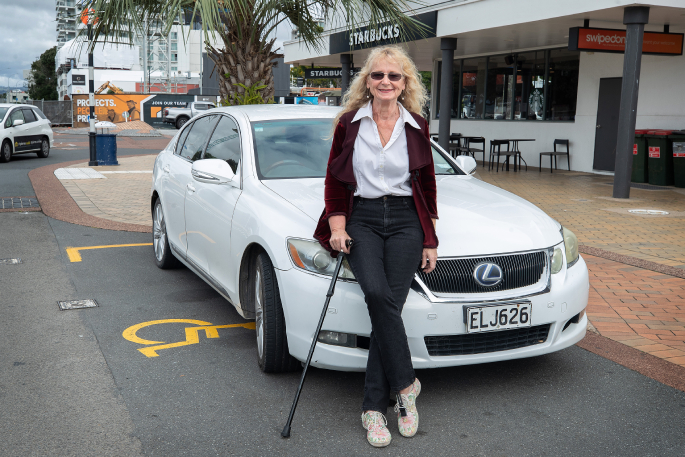

6 comments
Mobility parks
Posted on 03-09-2024 12:01 | By peanuts9
You have to be caught using these spaces before you can be fined. Increasing the fines is not likely to solve the problems with these parking spaces, as they are seldom policed by the council or the carpark owners.
disability parking
Posted on 03-09-2024 12:17 | By dumbkof2
should also apply to publicly accessed parking as well. supermarkets etc
Disability Parking fees.
Posted on 03-09-2024 12:31 | By P.Homan
Just read this article, let's hope it works for the people who really need it. Who will monitor it?
Does this include the Mothers with babies parking? I recently saw a young woman park in one, leap out of her car to go into the supermarket. I noticed a childs seat in the passenger side covered with a white cloth, I only paused as she had not checked under the cloth for a baby. I was in the shop for 30 min and she came out the same time as me and again did not check under the cloth. I was not checking up on her at all but being parked next to her - in a legal park - I saw it all. What are the rules for these parks please?
Fines in General
Posted on 03-09-2024 18:22 | By Yadick
Fines in general need seriously reviewing. Only $150.00 for running a red light. Put that up to at least $800.00 because of the danger involved. $500.00 for a late orange light. Stop signs the same.
Thanks, Claire
Posted on 05-09-2024 10:32 | By Linton Heatley
Well done, Claire, for your time, trouble, & effort. Thanks!
Great work Claire
Posted on 11-09-2024 11:09 | By Perkybop
You did so well getting this over the line. Thanks for your efforts on behalf of thousands.
Leave a Comment
You must be logged in to make a comment.